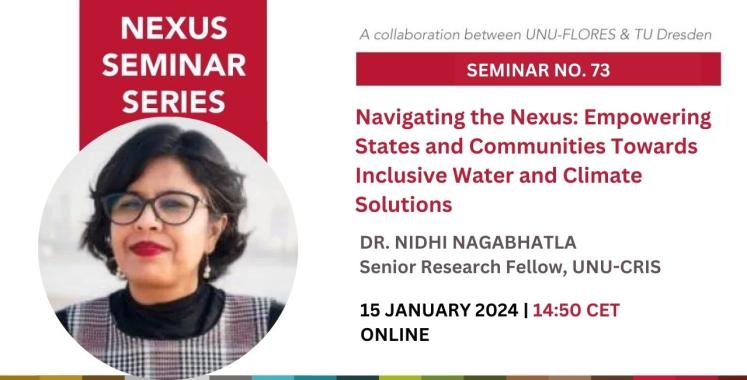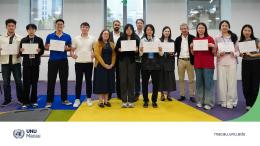The Nexus between water, gender, and climate showcases the intersectionality pivotal in building inclusive, sustainable societies and resilient communities. In this discussion, we will focus on understanding empowerment through the ‘access’ context and provide empirical reflections on how addressing water disparities could empower women, enhancing education and economic prospects while supporting the implementation of SDG 5 and 6 targets and also other SDGs directly or indirectly linked to gendered development pathways. Also, it is important to note that best practices toward gender-responsive policies across and between sectors and agencies can help promote inclusive socio-economic growth and opportunities while aiding equitable water access and management and fostering societal resilience.
In this context, the discussion will highlight the role of a multi-stakeholder coalition led by UNESCO (Water Programme), with experts and member states of the United Nations, including the key insights from the UN 2023 Water Conference in New York, wherein the coalition members discussed the ‘gender-sensitive’ implementation plan and roadmap towards completing the 2030 Agenda for Sustainable Development through concrete actions and voluntary commitment, including a plan for the digital platform. In tandem, it is pertinent to take note of challenges in creating ‘gender-sensitive’ societies. More so, in the context of climate adaptation, wherein inequality perpetuating in the wake of insufficient gender integration in water and climate policies sustains disparities and hinders societal progress.
Acknowledging barriers women and girls face in their participation and representation decision-making and resource allocation impact reflects ‘blind spots’ in deploying a gendered approach to sustainability agenda. In conclusion, the discussion will reflect on the gender-focused climate action agenda from COP 28, emphasising inclusivity and rights-based governance and the need for boosting gender-responsive approaches to climate-triggered human displacement and migration that disproportionately impact gender groups. Various agencies and coalitions pitched for better gender integration into climate-smart practices in agriculture, transportation, and urban settings towards amplifying resilience and inclusivity (and just transition) while showcasing initiatives and collaboration pathways through digital platforms, innovation systems, and artificial intelligence as agents to magnify the impact and realising the transformative agenda of gender-responsive and equitable societal shifts. In addition, we need to acknowledge that addressing challenges in gender-sensitive policy implementation and the need for comprehensive policy frameworks that integrate gender considerations effectively across environmental policies and climate adaptation strategies ensures a fair and inclusive transition for all.
About the Speaker: Dr Nidhi Nagabhatla
Dr Nidhi Nagabhatla is a Senior Research Fellow and Cluster Coordinator: Climate Change and Natural Resources program at UNU CRIS. In this capacity, Nidhi Nagabhatla will be coordinating the projects, programs and activities of the cluster while contributing to environmental governance-related activities and outputs by collaborating with staff and networks. She is also the Project Leader at UNU CRIS for “GCRF Global Seaweed STAR – Safeguarding the future of Seaweed Aquaculture’ a partnership with The Scottish Association for Marine Science (SAMS) focusing on developing countries in East Africa and Southeast Asia. Dr. Nagabhatla is a sustainability science specialist and a systems analyst. With 21 years of work experience, she has led, coordinated, and implemented transdisciplinary projects in various geographical regions of Asia, Africa, Europe, and the Americas, working with international.
Background of the Series:
UNU-FLORES, in collaboration with PRISMA – Centre for Sustainability Assessment and Policy on behalf of TU Dresden, is excited to announce the Nexus Seminar Series. The joint seminar series, which launched in 2015, features lectures by senior scholars and successful practitioners that highlight all dimensions of research on the Nexus Approach, ranging from hands-on implementation strategies to theoretical debates. The Nexus Seminars serve not only as a platform for scientific exchange and cooperation between UNU-FLORES and TU Dresden but also as a medium for the partner institutions to discuss their research with a broader audience. The Nexus Seminar, which takes place monthly during the academic semester, is open to the public and delivered virtually through online webinars.



